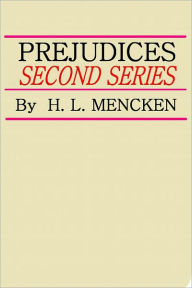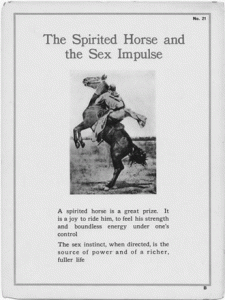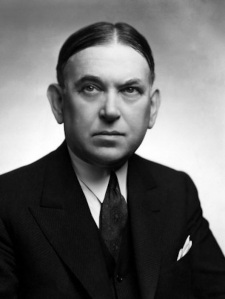The second half of H. L. Mencken’s Prejudices: Second Series carries on topically exploring issues as diverse as the application of the work ethic to artists to Prohibition. The articles continue Mencken’s assault on American conformity and democracy, but they are so wide-ranging that it starts to really seem that he is onto something. He even manages what can be seen as a critique of capitalism. However, he is not really opposed to it as exploitation of working people. The problem with capitalism and capitalists is that they are driven to banality by the pursuit of wealth (something Mencken does not really respect, although he understands it). That it also seems to drive workers toward the fad of socialism does not help matters. His criticism of capitalism (or at times state power) is derived from what he sees as the same ill of democracy. It forces most of us to lazy thoughts and conformity. The two most important essays in this volume after “The National Letters” are his explorations of Prohibition and marriage.
But let us start with “The Divine Afflatus,” which is mostly a criticism of the application of the work ethic to art. He questions the work of a journalist named Chesterton, for his argument that creative inspiration does not exist and that creativity is largely a function of how hard an artist works. Mencken relies that inspiration is variable and contextual and simply cannot be confined to a simple formula such as “write one thousand words a day.” At the end, he states his fear that the artist will become a manufacturer. As he probably well knew, many writers were already essentially manufacturers churning out stories for pulp magazines at dizzying rates.
“Scientific Examination of a Popular Virtue” is a brief questioning of the value of altruism. It is not some proto-Ayn Rand. Just an investigation about why people are so willing to do favors for others that seem to provide no pleasure to the favor giver and are based on lies. (Think of the professor trying to write nice things about an atrocious student essay.)
“The Allied Arts” is about music, painting, and stage. If you read Mencken you know he often has music in his mind. He cannot help himself but bring Beethoven or Wagner into the discussion. In fact, these seem to be his model of the great artists. His general thesis in “The Allied Arts” is that the vast majority of human beings simply cannot appreciate music and should not try. He is glad that rich people fund music but doubt that they understand it at all. He questions the gaudiness of the visual components of opera. As with literature, “the allied arts” are challenged by the same tendency toward mediocrity, stage is perhaps the most susceptible.
“The Cult of Hope” and “The Dry Millennium” are about reform, in particular Prohibition. The first essay is a warning against allowing criticism to be taken in by reform efforts. We have seen this before when Mencken expressed discomfort at criticism or literature becoming essentially an adjunct to political efforts. He praises Havelock Ellis for having the honesty to point out that no prostitute was more dangerous to a community than a vice squad. This is something contemporary Americans know well as they are finally approaching sanity on the “war on drugs.”
“The Dry Millennium” is a brilliant and funny assault on Prohibition, which was just being enacted. He rightly argued that it would be futile to abolish the consumption and production of alcohol, but more troubling was Mencken’s conviction that the masses would more or less embrace Prohibition. None of the general strikes by working people emerged in response to Prohibition. While the masses will eat up the reform fad, any “civilized” people will stay in Europe. Women will embrace it because it means their husbands will stay at home, even if it means the lubricating effect of alcohol on relationships will be muted for a while. For Mencken, the problem with Prohibition is that it will simply exacerbate the worst characteristics of Americans.
“Appendix on a Tender Theme,” the final essay in Prejudices: Second Series, is about marriage and love. It starts with an anatomy of a relationship from romance, to the breaking of the spell, to habit. Yet, there is something promising in relationships and in love, something that promises to liberate people. Love and sex and relationships are dangerous and not at all boring or banal, despite the constant efforts of the social hygiene folks to reduce marriage to a science. The problem comes with the later phase of the relationship, when it descents into repetition and habit. There is no room for creativity and art in this relationship. He mentions the struggles Wagner had with creativity while married to Minna Planer. Thus there is something antithetical to the artist and marriage. Mencken speaks in gendered terms here (the artist is always a man; the mental block always a marriage to a woman), but we can universalize the concept, given any pairing of a creative person with a person who thinks marriage is best built with bricks and bars.
The day is saved, as every one knows, by the powerful effects of habit. The acquisition of habit is the process whereby disgust is overcome in daily life—the process whereby one may cease to be disgusted by a persistent noise or odor. One suffers horribly at first, but after a bit one suffers less, and in the course of time one scarcely suffers at all. Thus a man, when his marriage enters upon the stage of regularity and safety, gets use to his wife as he might get used to a tannery next door, and vice versa. I think that woman, in this direction, have the harder row to hoe, for they are more observant than men, and vastly more sensitive in small ways. But even women succumb to habit with humane rapidity, else every marriage would end in divorce. (290)
We have to (as usual) try to get beyond the sexist language to see the heart of the matter. Marriage endures because we are slavish and cowardly and easily seduced by routine. Our art sucks for the same reason.







